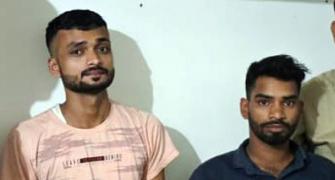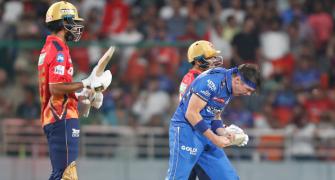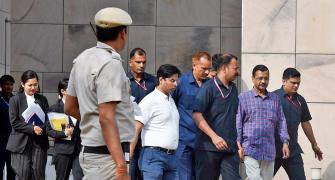The six presidential nominees to the Rajya Sabha have reportedly been handpicked by Congress chief Sonia Gandhi, in an attempt to reassert her authority in the United Progressive Alliance government, which has allegedly acquired a pro-United States stance under the aegis of Prime Minister Manmohan Singh.
The five persons nominated are Mani Shanker Aiyer, Javed Akhtar, Dr Balchandra Mungekar, Bombay Jayshri and Dr Ram Dyal Munda.
Except for Mani Shanker Aiyer, a former bureaucrat-turned full-time politician who lost in the last Lok Sabha election, the others have been carefully handpicked to lend weight to the UPA's attempts of balancing all sections of the society.
Aiyer's induction is being seen as more than significant in political circles, since he is known to be anti-US, still believes in the doctrine of socialism and is not a fan of Dr Singh and his brand of reformist and pro-US politics. Aiyer had been relived of his post of petroleum minister during the UPA's first stint due to his anti-US stance on a number of issues, and Murli Deora, an advocate of closer ties with America, replaced him.
Incidentally, Aiyer was a close friend of former prime minister Rajiv Gandhi and maintains a cordial relationship with Sonia Gandhi. He is also perceived as a leader who can counter the growing influence of Environment Minister Jairam Ramesh, another liberal reformist who wants stronger Indo-US ties. Like Ramesh, Aiyer is known to be a bright politician and a more than competent draftsman.
The Bharatiya Janata Party has already registered its objection to Aiyer's nomination, but the Congress has pointed out that such nominations have taken place many times in the past.
Eminent lyricist Javed Akhtar was chosen by 10 Janpath to compose a special poem on the occasion of former prime minister Indira Gandhi's 25th martyrdom day on October 31 last year, as well as for a special programme in the Parliament's central hall. The talented and much-honoured Akhtar was chosen as he has always been an articulate voice against the conservative and fundamentalist factions of the minority community.
Bombay Jayshri, an eminent Carnatic singer, is a Tamilian and lives in Chennai.
Her performance on October 31, on Indira Gandhi's death anniversary, had reportedly impressed Sonia Gandhi.
Dr Balchandra Mungekar, a Dalit, is a member of the Planning Commission and an eminent agricultural economist, social activist and educationist. He is known to be a bitter critic of the PM and is particularly opposed to the western mode of reforms adopted by Dr Singh.
The erudite Mungekar has led a life of poverty and struggle; his father earned Rs 10 per week and the family lived in a slum without electricity. Mungekar, a man of simple tastes and a very simple lifestyle, rose up the ladder by studying hard and staying focused on his goals. The 64-year-old-economist hails from a village called Munge in Maharashtra's Konkan district.
And finally, Dr Ram Dyal Munda hails from a tribal community and has earlier served as the vice chancellor of Ranchi University. He was the first person to float the theory of a separate Jharkhand, which was initially envisaged as a separate tribal country.
As the protagonist of the tribal movement, he is believed to be a Maoist sympathizer, but the government may use his services to build a bridge with the Left-wing extremists.
The UPA government is focused, at the moment, in bringing the Maoists to the table for a dialogue. Sources in the government say that a key tribal voice, on the side of the government, could be a potent force for the Centre to use in its fight against the Maoists.







